The AMD 2nd Gen Ryzen Deep Dive: The 2700X, 2700, 2600X, and 2600 Tested
by Ian Cutress on April 19, 2018 9:00 AM ESTCPU Office Tests
The office programs we use for benchmarking aren't specific programs per-se, but industry standard tests that hold weight with professionals. The goal of these tests is to use an array of software and techniques that a typical office user might encounter, such as video conferencing, document editing, architectural modelling, and so on and so forth.
All of our benchmark results can also be found in our benchmark engine, Bench.
Chromium Compile (v56)
Our new compilation test uses Windows 10 Pro, VS Community 2015.3 with the Win10 SDK to combile a nightly build of Chromium. We've fixed the test for a build in late March 2017, and we run a fresh full compile in our test. Compilation is the typical example given of a variable threaded workload - some of the compile and linking is linear, whereas other parts are multithreaded.
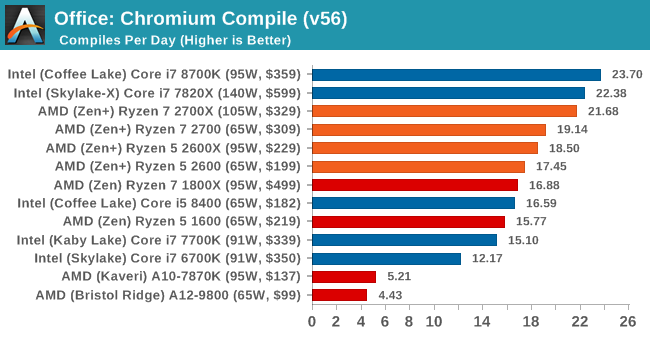
Having redone our compile testing, we can see that the new Ryzen-2000 series parts do provide a good uplift over the first generation, likely due to the decreased cache latencies and better precision boost. Performance per dollar between the 8700K and the 2700X would seem to be about equal as well.
PCMark8: link
Despite originally coming out in 2008/2009, Futuremark has maintained PCMark8 to remain relevant in 2017. On the scale of complicated tasks, PCMark focuses more on the low-to-mid range of professional workloads, making it a good indicator for what people consider 'office' work. We run the benchmark from the commandline in 'conventional' mode, meaning C++ over OpenCL, to remove the graphics card from the equation and focus purely on the CPU. PCMark8 offers Home, Work and Creative workloads, with some software tests shared and others unique to each benchmark set.
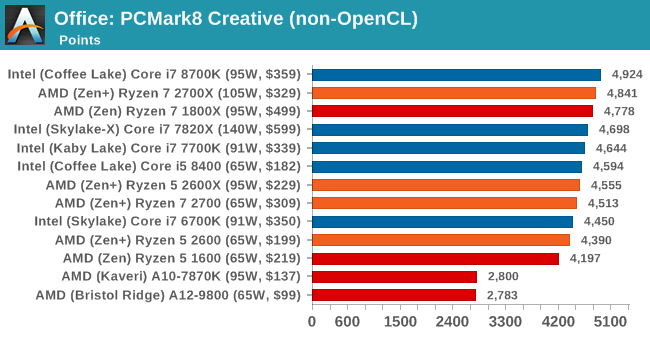
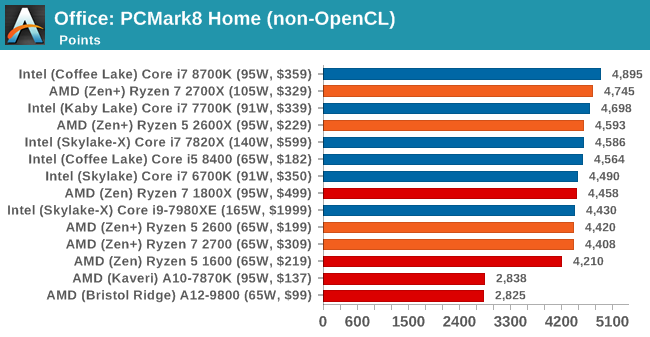

PCMark 10
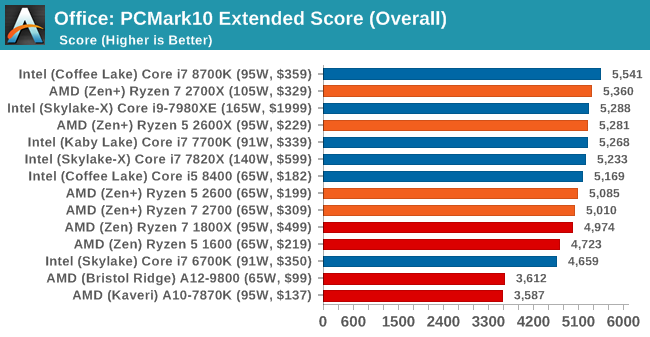
GeekBench4
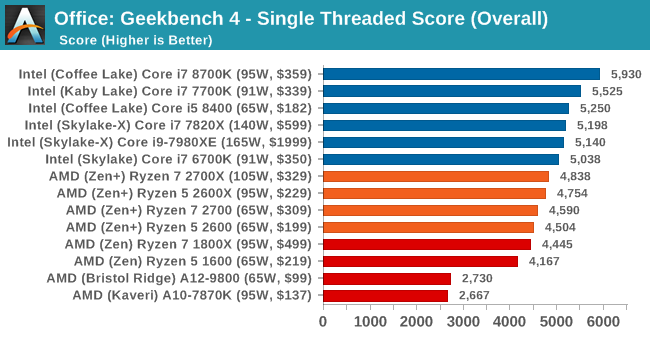
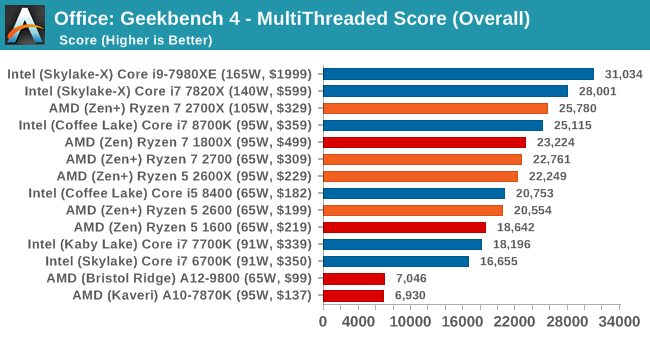
If you live and breathe GeekBench 4, then the single threaded results put Intel firmly in first place. For the multi-threaded tests, the top Intel and AMD mainstream parts are going at it almost neck-and-neck, however it is clear that the previous generation quad-cores are falling behind.










545 Comments
View All Comments
eek2121 - Thursday, April 19, 2018 - link
Their benchmarks are garbage? You are welcome to buy a 2700X and test for yourself. The benchmarks they used are built in for the most part to each game. It coincides pretty much with what I know of Ryzen, Coffee Lake, and Ryzen 2xxx.AndersFlint - Thursday, April 19, 2018 - link
While out of respect for the reviewer's hard work, I wouldn't describe the results as "garbage", they certainly don't match up with results from other publications.ACE76 - Thursday, April 19, 2018 - link
Yes, Anandtech's are honest and objective...I believe Tech Radar was comparing Coffee Lake OC'd to 5.2ghz vs Ryzen 2700x at 4.1ghz...the stock turbo alone hits 4.3ghz...they are slanting to benefit Intel...a 5.2ghz stable overclock on Coffee Lake alone is very hard to achieve and maybe 10-15% of CPUs can do it.Luckz - Monday, April 23, 2018 - link
I haven't really heard of anyone unable to reach 5 GHz.SkyBill40 - Thursday, April 19, 2018 - link
Well, golly gee... did the other reviewers use the *exact* setup as used here? No? Hmm... I guess that then makes your grouchy mcgrouchface missive not worth consideration then, no? If anyone is to not be taken seriously here, it's you.Typical ad hominem and burden of proof fallacies. Well done, Chris113q.
Flying Aardvark - Thursday, April 19, 2018 - link
WRONG. AT has it right, these are properly patched systems. Heavy IO perf loss with Intel Meltdown patches has been well known for months. See top comment here. https://np.reddit.com/r/pcmasterrace/comments/7obo...Prove your claim that the data is incorrect or misleading in any way whatsoever, child.
RafaelHerschel - Thursday, April 19, 2018 - link
One of the problems is that other reviewers see a less pronounced difference between the new AMD Ryzen CPU's and the older ones. Most reviewers claim that they have tested with all available patches in place.Your conclusion that AT has it right is based on what? Your belief that AT can't make mistakes? Maybe there is a logical explanation, but for now, it seems that AT might have done something wrong.
Flying Aardvark - Friday, April 20, 2018 - link
I have evidence to backup my claim, users with no motivation to mislead agree with AT, and did months ago. You have no evidence, simply butthurt. Good luck.boozed - Thursday, April 19, 2018 - link
Let's ask a total jerk from the internet what he thinks.aliquis - Thursday, April 19, 2018 - link
They definitely used slower memory. Don't know if that's the thing. Don't know what fps others get in the same games and settings. Otherwise maybe it's ASUS doing special tricks like with MCE before or have better memory timits or can use some trick to get similar of precision boost overdrive already. Or a software mistake.Sweclockers is the best for game performance. They do 720p medium so the gpu limits will be smallest there.